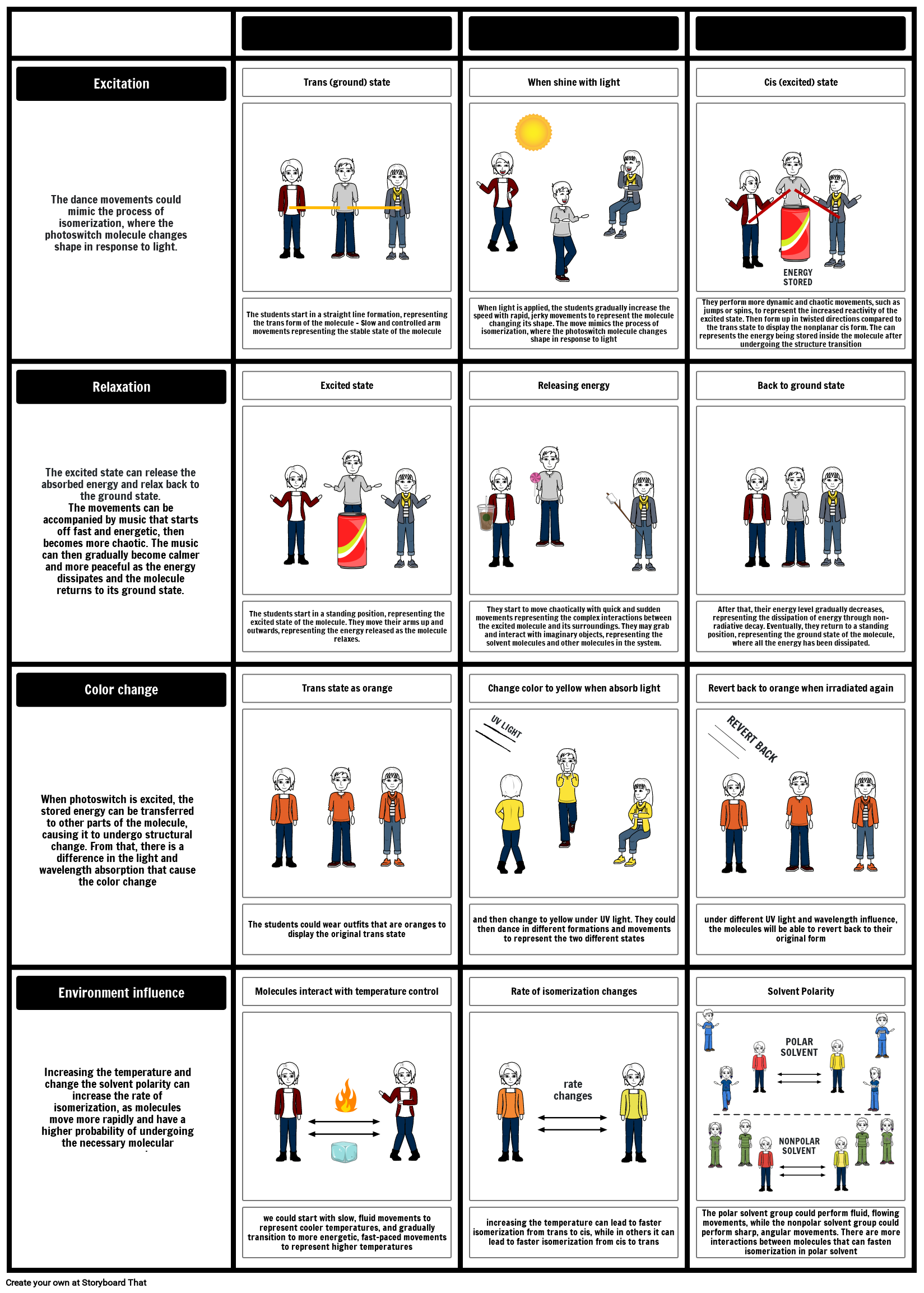Photoswitch

Storyboard Text
- Excitation
- The dancers could start in a straight line formation, representing the trans form of the molecule, and then break apart and twist in different directions to represent the cis form. This could be repeated several times, with the dancers gradually getting faster and more chaotic to represent the energy being stored in the molecule.
- Trans (ground) state
- When shine with light
- Cis (excited) state
- Relaxation
- The dancers could start in a straight line formation, representing the trans form of the molecule - Slow and controlled arm movements representing the stable state of the molecule
- Excited state
- When light is applied, the students gradually increase the speed with rapid, jerky movements to represent the molecule changing its shape. The move mimics the process of isomerization, where the photoswitch molecule changes shape in response to light
- Releasing energy
- They perform more dynamic and chaotic movements, such as jumps or spins, to represent the increased reactivity of the excited state. Then form up in twisted directions compared to the trans state to display the nonplanar cis form. The can represents the energy being stored inside the molecule after undergoing the structure transition
- Back to ground state
- The excited state can release the absorbed energy and relax back to the ground state.The movements can be accompanied by music that starts off fast and energetic, then becomes more chaotic and dissonant as the non-radiative decay process occurs. The music can then gradually become calmer and more peaceful as the energy dissipates and the molecule returns to its ground state.
- Color change
- When photoswitch is excited, the stored energy can be transferred to other parts of the molecule, causing it to undergo structural change. From that, there is a difference in the light and wavelength absorption for both the ground state and excited state
- The dancer starts in a standing position, representing the excited state of the molecule. They move their arms up and outwards, representing the energy released as the molecule relaxes.
- they start to move chaotically and erratically, with quick and sudden movements, representing the complex interactions between the excited molecule and its surroundings. They may grab and interact with imaginary objects, representing the solvent molecules and other molecules in the system.
- UV LIGHT
- As the dancer moves, their energy level gradually decreases, representing the dissipation of energy through non-radiative decay. Eventually, they return to a standing position, representing the ground state of the molecule, where all the energy has been dissipated.
- The dancers could wear outfits that are one color in the dark
- and then change to another color under UV light. They could then dance in different formations and movements to represent the two different colors
- different UV light and wavelength influence
- Environment influence
- Increasing the temperature increases the rate of isomerization, as molecules move more rapidly and have a higher probability of undergoing the necessary molecular rearrangements.
- Solvent Polarity
- POLARSOLVENT
- NONPOLARSOLVENT
- you could start with slow, fluid movements to represent cooler temperatures, and gradually transition to more energetic, fast-paced movements to represent higher temperatures
- increasing the temperature can lead to faster isomerization from trans to cis, while in others it can lead to faster isomerization from cis to trans
- The polar solvent dancer could perform fluid, flowing movements, while the nonpolar solvent dancer could perform sharp, angular movements. there are more interactions between molecules that can fasten isomerization in polar solvent
Over 30 Million Storyboards Created
No Downloads, No Credit Card, and No Login Needed to Try!
